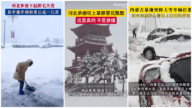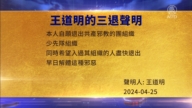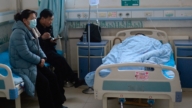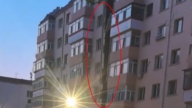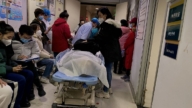【新唐人2014年06月30日訊】大陸媒體人鄧飛在看到貴州的鄉村孩子們餓著肚子上學的心酸情景之後,開始建立自己的慈善事業,為農村孩子提供免費午餐。美國有線新聞網(CNN)報導指出,中國從頂層開始就是一個一黨專制國家。但是草根運動一直在底層沸騰,帶來亟需的社會改變。
在三年裡鄧飛的「給孩子免費午餐」運動,餵養了總共92000名孩子,跨越23個省份。
鄧飛告訴美國有線新聞網《CNN》﹕「(中共)政府不能解決我們的所有問題」,「我們必須放棄不切實際的想法,自己採取主動行動。」
按照官方統計,中國有五十萬個註冊非政府組織,英文稱NGO。而未註冊的NGO數字,專家估計接近2百萬。
散佈於全中國的非政府組織,致力於改善當地人們的生活,不管是勞工問題,婦女權益還是環境問題。
《中國勞工通訊》創始人韓東方說,官方工會未能代表這個國家工人的需要。中國的工人們沒有選擇,只能讓自己成為改變這個國家的力量,爭取更好的薪資和發動公民行動。
由於中共對民間團體抱有強烈的戒心,還有許多的中國NGO迫於無奈,只能註冊成為工商團體。北京「益仁平中心」是一個非營利性的公益機構,成立於2006年12月19號,致力於開展疾病防治健康教育、病患者救助及消除歧視等公益工作。但是創辦人陸軍告訴《新唐人》,「益仁平」做的是工商註冊。
北京益仁平創辦人陸軍:「由於在中國,民間組織的註冊就很難獲得民政部門的支持,民政部門很難為民間組織進行註冊。所以我們現在和許多NGO一樣,都是工商註冊。」
北京益仁平中心創辦人陸軍說,張冠李戴的註冊給NGO展開工作帶來諸多困難。因為在NGO來講,它是公益組織和志願者組織,有大量的工作需要志願者來開展。但是由於工商註冊機構沒有會員,所以志願者的凝聚力,管理和法律地位都存在問題。這種中國特色的NGO運營方式也常常令外國人感到困惑,因此在獲得外界的認可和支持方面,有很大的問題。
陸軍:「因為對於NGO來講,需要資金方面的支持,從外界籌款,另外一方面需要和外界進行合作,政府呀,企業呀,其他非政府組織啊,國際合作啊,那人家一看你是一個工商註冊機構,那麼就會想當然的認為你是一個盈利機構。這樣的話,無論是對於你的捐款,還是和你的合作,都會有所顧慮。」
陸軍表示,在中國NGO一向都是政府非常擔心,非常顧慮,非常警惕,非常緊張的監控對像。所以在過去這些年裡,很多NGO被政府取締、罰款、各種懲罰。「益仁平」辦公室也曾經遭到搜查,他們的同事也曾經被調查,也有同事曾經失蹤,網站被屏蔽。
陸軍:「維穩部門應該說它對NGO一貫都是非常警惕、非常保守的,甚至非常過時的一種看法。在他們眼裡,中國NGO會像中東、東歐一樣,會要掀起顏色革命,這種擔心在05年、06年之後,可以說是達到了登峰造極的地步。」
陸軍指出,中國當前社會矛盾突出,NGO實際上起到的作用是解決社會矛盾,對於民眾的福祉、國家的穩定,作出的是正面貢獻。因此當局對NGO採取敵對的態度,非常不可理喻。
據了解,隨著中國社交媒體的興起,中國的公民社會變得更加緊密,能夠更好的分配資源,將需要的人們聯繫到一起,包括中國煤礦工人,他們往往孤立的面對致命性的矽肺病。
《CNN》引述《經濟學人》雜誌北京分社社長麥傑斯(James Miles)的話說,今天的中國民眾跟25年前的「天安門時代」相比,可以更快速的組成團體。政府在控制信息傳播,制止民眾組織的方面,也將變得更加困難。他相信公民社會在改變中國的政治格局方面,可能能很好的扮演一個關鍵角色。
採訪編輯/秦雪 後製/舒燦
Grassroots Activism Bubbling Up Despite Single- Party Rule
Deng Fei, a journalist, saw it first-hand on a reporting trip
in Guizhou province: scores of children going to school hungry.
Deng started his own private charity
to provide free meals for China’s village children.
As reported by CNN, China is a single-party state run from the top.
But grassroots activism has been bubbling up from beneath,
bringing about much needed social support and change.
Deng’s “Free Lunch for Children” campaign, in 3 years,
has fed a total of 92,000 kids across 23 Chinese provinces.
“The government won’t be able to solve all our problems,"
Deng tells CNN. “We must give up this unrealistic idea
and take the initiative ourselves.”
Officially, China has around half a million registered
non-governmental organizations (NGOs),
most with government connections.
Unregistered independent NGOs, number
close to two million as estimated by some professionals.
These are tiny little groups of people all over the country
trying to improve the lives of people in those areas:
on labor issues, women’s rights or the environment.
Han Dongfang, founder and director of China Labor Bulletin,
said China’s national trade union has failed to represent
the needs of the nation’s workers.
So the workers have no choice
but be their own force for change
striking for better wages and
launching civil action for just compensation
The Party remains vigilant toward these NGOs.
Therefore, a lot of NGOs in China have been forced to register
as industrial and commercial associations.
For instance, Beijing “Yi Ren Ping Center” is a
non-profit charity organization, founded December 2006.
It works in health education for
prevention and treatment of disease,
medical rescue and elimination of discrimination.
Lu Jun, founder of “Yi Ren Ping Center” told NTDTV
it was registered as a commercial association.
Lu Jun: “In China, it’s very hard for an NGO to get approved
by the civil administration department.
So, like a lot of others , we are registered as
industrial and commercial associations.”
As reported by CNN, the misleading registration has caused
a lot of difficulties for NGOs, normally charity organizations
dependent on volunteers.
But, industrial and commercial structures
lack the cohesive force to get volunteer support.
Chinese-style NGOs often confuse foreigners.
It’s challenging for them to gain support and approval.
Lu Jun: “NGOs need to raise funds externally.
We also need to cooperate with governments,
companies, other NGOs, and internationally.
When your partners see the way you are registered,
they will assume you are a for-profit organization.
This is a concern when they consider donating money
or collaborating with you.”
Lu Jun said in China the government has been watchful of NGOs.
In the past, a lot were banned or fined.
“Yi Ren Ping” office has been searched
and colleagues investigated.
Some coworkers went missing for days,
and their website closed down.
Lu Jun: “The stability maintenance department’s view of NGOs
is out-of-date. In their eyes, NGOs in China are like Middle-East
groups which might bring about a revolution.
They were unprecedentedly worried in 2005 and 2006. ”
Lu Jun pointed out that NGOs can help alleviate social conflict.
They positively contribute to people’s happiness
and the nation’s stability.
It’s hard to understand the Party’s attitude.
With the rise of social media in China,
society is more connected and better resourced than before,
bringing people in need together,
including China’s once isolated coal miners
suffering from deadly lung diseases.
James Miles, the Economist’s Beijing Bureau Chief,
said in CNN’s report: “What we might see now compared
with 25 years ago during Tiananmen, is that the cells of
organizations are more quickly formed.”
“It would be more difficult for the government
to control information, to stop people organizing, and to stop
the flow of information in these kinds of critical events.”"
Miles believes civil society may very well play a crucial role in
changing China’s political landscape.
Interview & Edit/QinXue Post-Production/ShuChan



